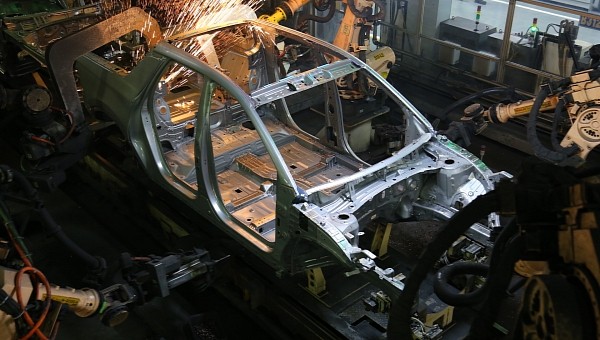The chip shortage keeps disrupting the automotive market, and just earlier this week, Skoda decided to temporarily halt its production because of the lack of semiconductors.
While some carmakers are still battling the constrained chip inventory, others are trying to make the most of the current market conditions.
Hyundai has recently revealed its January 2023 sales results, and the numbers are encouraging, especially when comparing them to the same month of the previous year.
The company sold over 306,000 units worldwide, and this represents an increase of no less than 8.4 percent year-over-year.
Hyundai’s sales increased in pretty much every large market. In South Korea, the total sales in January 2023 were up 11.5 percent from January 2022, with the company shipping over 51,500 vehicles. The overseas sales got close to 255,000 units, an increase of 7.8 percent compared with the same month of the previous year.
The carmaker says its solid market performance is the result of the introduction of “popular new models and strong demand for the brand,” admitting that the uncertainties in the industry are still causing particular challenges in the short term.
While the numbers are uplifting not only for Hyundai but for the rest of the industry too, especially because they seem to suggest that the chip shortage is gradually easing off, a quick comparison of the January 2023 numbers with the ones reported in December 2022 paint a completely different picture.
Sales in Korea went down no more, no less than 26.8 percent in January as compared to the previous month, when the carmaker shipped over 70,000 vehicles to domestic buyers. At the same time, sales in overseas markets declined 7.4 percent, as Hyundai’s sales in non-Korean markets exceeded 275,000 vehicles in December (versus 254,793 units in January).
Overall, Hyundai’s sales in January went down 11.4 percent as compared to the previous month.
The South Korean company has also shared its target for 2023, revealing that it plans to sell 4.32 million units across the world. The domestic market should account for about 781,000 units, whereas the overseas market should generate total sales of 3.54 million units.
At the end of the day, it’s very clear that the chip shortage, mixed with all the other challenges, including rising inflation and skyrocketing material prices, would continue to impact car sales in 2023.
Most auto manufacturers are still cautious when it comes down to releasing 2023 sales targets. Toyota recently announced that it plans to sell 10.6 million vehicles this year, admitting that the chip shortage could eventually cause a 10 percent drop. Releasing an accurate forecast, however, is rather difficult, Toyota said, as the uncertainties in the market are still hurting the industry.
General Motors’s CEO Mary Barra said the lack of semiconductors would remain a big concern throughout 2023, suggesting that in some cases, the struggle could expand to 2024 as well.
Hyundai has recently revealed its January 2023 sales results, and the numbers are encouraging, especially when comparing them to the same month of the previous year.
The company sold over 306,000 units worldwide, and this represents an increase of no less than 8.4 percent year-over-year.
Hyundai’s sales increased in pretty much every large market. In South Korea, the total sales in January 2023 were up 11.5 percent from January 2022, with the company shipping over 51,500 vehicles. The overseas sales got close to 255,000 units, an increase of 7.8 percent compared with the same month of the previous year.
The carmaker says its solid market performance is the result of the introduction of “popular new models and strong demand for the brand,” admitting that the uncertainties in the industry are still causing particular challenges in the short term.
While the numbers are uplifting not only for Hyundai but for the rest of the industry too, especially because they seem to suggest that the chip shortage is gradually easing off, a quick comparison of the January 2023 numbers with the ones reported in December 2022 paint a completely different picture.
Sales in Korea went down no more, no less than 26.8 percent in January as compared to the previous month, when the carmaker shipped over 70,000 vehicles to domestic buyers. At the same time, sales in overseas markets declined 7.4 percent, as Hyundai’s sales in non-Korean markets exceeded 275,000 vehicles in December (versus 254,793 units in January).
Overall, Hyundai’s sales in January went down 11.4 percent as compared to the previous month.
The South Korean company has also shared its target for 2023, revealing that it plans to sell 4.32 million units across the world. The domestic market should account for about 781,000 units, whereas the overseas market should generate total sales of 3.54 million units.
At the end of the day, it’s very clear that the chip shortage, mixed with all the other challenges, including rising inflation and skyrocketing material prices, would continue to impact car sales in 2023.
Most auto manufacturers are still cautious when it comes down to releasing 2023 sales targets. Toyota recently announced that it plans to sell 10.6 million vehicles this year, admitting that the chip shortage could eventually cause a 10 percent drop. Releasing an accurate forecast, however, is rather difficult, Toyota said, as the uncertainties in the market are still hurting the industry.
General Motors’s CEO Mary Barra said the lack of semiconductors would remain a big concern throughout 2023, suggesting that in some cases, the struggle could expand to 2024 as well.






